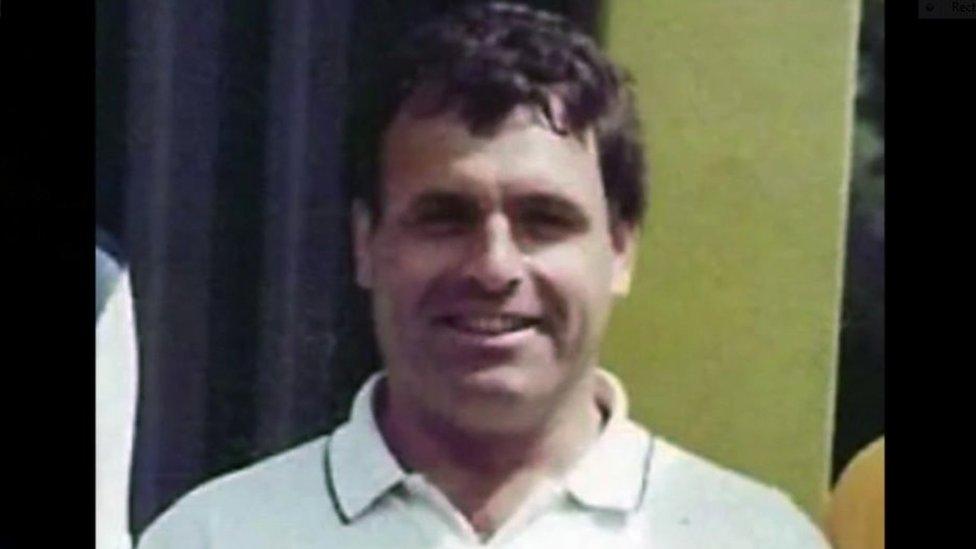Covid court delays: Weeds, leaks, and four-year waits for justice
- Published

'Paul' was accused of committing a domestic burglary in June 2018.
In early 2019 he was told by police that no further action would be taken against him. However, he was subsequently charged.
Last week - over two years since the alleged offence - he appeared at Inner London Crown Court.
But his barrister told the court that the Crown Prosecution Service (CPS) had still not served the sole evidence - DNA - in the case on the defence.
Paul (not his real name) is on bail and had his trial put on provisional "warned" list - for December 2021.
It means there is no guarantee it will take place at that time - just that it might.
The judge explained apologetically that priority is being given to cases where defendants are being held in custody.
So, three and a half-years from the date of the alleged offence, there has been no justice for the alleged burglary victim - or the accused.
Trials listed for 2023
Paul's was one of a number of cases I saw on a visit to Inner London with the chair of the Criminal Bar Association (CBA) James Mulholland QC. He told me it was typical.
"This is justice 2020, but it has been like this for the last 10 years, delay after delay, inbuilt into the system. These cases are being pushed back continuously.
"Lack of investment is at the heart of it and government needs to understand that you don't create a proper justice system without proper investment.
"What we are seeing here are the fruits of a lack of interest."
That apparent "lack of interest" is reflected in the state of some court buildings. Outside Inner London I saw a dead pigeon decaying on netting, vast weeds growing up the side of the building and old pipes leaking water.
Meanwhile, a court official told me that some court centres are now listing trials for 2023.
The delays are caused by a range of factors.
Lawyers point to huge cuts to the police, CPS and other agencies such as probation.
There are a range of things malfunctioning within the system. They include long initial delays caused by police "releasing suspects under investigation" - sometimes for years - before a charging decision is made.
Systemic problems continue with the CPS serving evidence late on the defence, meaning lawyers cannot advise their clients in a timely manner.
And perhaps most significantly - the decisions by government to cut thousands of crown court sitting days. That has meant that courts have been mothballed while trials stack up in a growing backlog.
None of these problems are caused by the coronavirus pandemic and lockdown, but they are of course exacerbated by it. Pre-lockdown the crown court backlog in England and Wales stood at some 37,000.
It is now over 46,000.

James Mulholland QC says lengthy waits are typical
"Adam" - not his real name - was accused of rape in March 2018. He denies the charge. His trial has been put back twice, once because of the pandemic.
He is now on a "warned" list for November, while his chosen career in one of the public services is on hold.
"I have suffered really bad with my mental health through it," he says. "I've had to up my dosage of anti-depressants. It's affected my potential career.
"The hard work I have done at university and everything to get me there it's all basically going out of the window now. I haven't got any trust or hope that it will be anywhere near the end of this year.
"I think it will be more like April next year."
Defendants 'suspended from jobs'
The next case I saw involved two young men charged with possession of drugs with intent to supply. The alleged offence took place in December 2017.
No one in court could explain the delay.
It was followed by a case in which the judge needed a pre-sentence report from the probation service in order to sentence the defendant. Despite repeated requests, no one was available.
In order to achieve a conclusion of the case, the judge had to devise a sentence which did not require a report. It was not ideal, but it showed professionals trying to do their best in the face of a lack of resources.
Emma Fenn, a barrister specialising in criminal work, paints a bleak picture.
"Defendants are suspended from their jobs with trial dates one to two years away. Some are losing university places with dates from the alleged offence to trial of four years.
"And some who are awaiting trial for 18-24 months on bail, can be on electronic tagged curfew from 7-7 every day, for up to two years."
To help deal with the situation, the government has announced that the period of time an accused person can be held before a trial - known as the Custody Time Limit (CTL) - will be increased from six to eight months.
But the government admitted - in response to a Freedom of Information request from the group Fair Trials - that it did not know how many people had been held in prison beyond the time limit since lockdown.
Lawyers fear some accused will spend more time in custody awaiting trial than the sentence they would eventually receive if they pleaded guilty - and that some might falsely plead guilty simply to bring an end to their case.
Life is bleak for those in custody awaiting trial, says Ms Fenn,
"There are often no visits from family or in-person visits from lawyers. Defendants can be locked up for 23.5 hours a day, education classes and courses are suspended, jobs within the prison restricted, and there are reports of showers being limited to 1-2 a week."
Covid has also removed a "huge amount of mental health, drug and alcohol agency support", she says.
A Ministry of Justice spokesperson said justice had been kept moving "despite the unprecedented challenges posed by the pandemic" and overall, cases are falling.
However, they acknowledged that "more needs to be done".
The government has launched an £80 million Criminal Courts Recovery plan, external which includes:
Employing 1,600 court staff to support recovery measures
Introducing plexiglass screens to separate members of the jury to enable safe use of more court rooms
Magistrate courts are seeing the number of outstanding cases drop - dealing with over 21,000 cases a week.
Increasing capacity through "Nightingale Courts" - 10 are up and running, a further eight planned to open shortly
Exploring new extended court 'COVID operating hours'
However, only three of the new Nightingale Courts are dealing with crime.
I visited one, Prospero House, a short walk from Inner London. It is a state of the art commercial building with three large courtrooms allowing ample room for social distancing. Every desk has hand sanitiser and protective gloves.
But Mr Mulholland says: "We need 60 criminal Nightingale Court buildings. At the moment we have just three."
The CBA says there are around 460 crown courtrooms in England and Wales. Currently around 100 are able to hear trials, though not all are hosting them.
The government says its plan will bring on stream another 250 of the existing rooms to hear jury trials by the end of October. The CBA believes that simply will not cut into the backlog.
Lawyers believe that the Treasury has long seen justice as a poor relation to health and education in terms of public spending.
"Investing in the criminal justice system is investing in the wealth and prosperity of the country," says Mr Mulholland.
"It is an empty and insulting promise for any minister to declare a war on crime if a government can't fund a system that keeps us safe - and ensures crimes are swiftly investigated and cases come to court on time."
- Published19 July 2020

- Published1 July 2020

- Published1 July 2020

- Published11 August 2020

- Published9 June 2020
